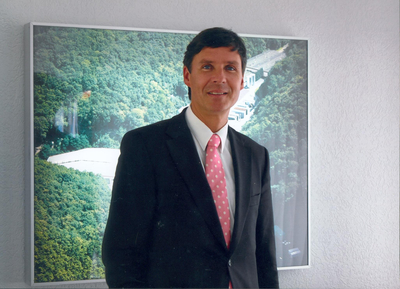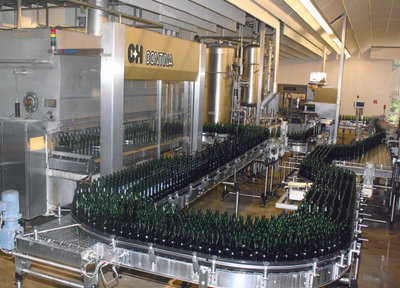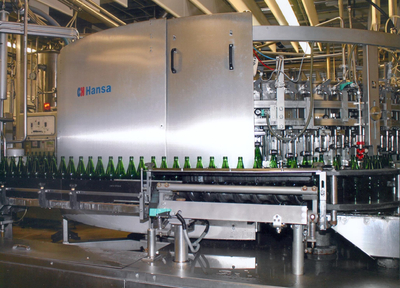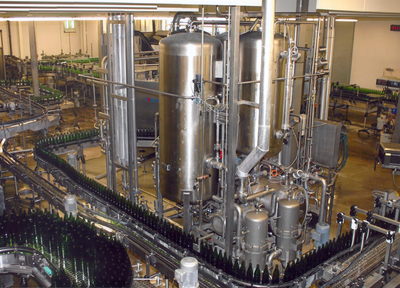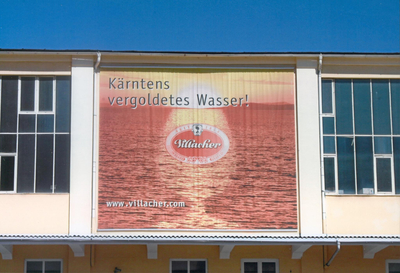
Focusing On The Brand
Tönissteiner Privatbrunnen believes in quality right across the board – with O + H technology and KHS service
Michael Schmidt*
Rhineland-Palatinate, Brohl-Lützing: the official site of the oldest known Roman spring in Germany. It's also the site of Tönissteiner Privatbrunnen, a mineral water bottling plant. Now in its fourth generation of family ownership, Tönissteiner doesn't just supply its consumers with a product the Romans once savored but also with an extremely palatable mineral water that has won several awards. The company also stands for clear brand leadership, has a strong presence and plenty of competence in the hospitality trade, and is also a pioneer in many different fields. Tilman Kerstiens, managing partner of Tönissteiner Privatbrunnen, says, "To exaggerate, we would say we see ourselves as a service provider with a sideline in mineral water. And this includes customers and their demand for top quality across the board being the chief focus of our business." This aspect also applies to the filling and packaging technology used in Brohl-Lützing. Kerstiens explains, "With O + H systems we are relying quite consciously on tried-and-tested, high-quality technical components which – and this is of the utmost importance – are excellently maintained by KHS' O + H Services. This service includes supplying us with original spare parts and carrying out regular maintenance, and also permanently adapting our technical setups to cope with the latest requirements."
Oldest Roman spring in Germany
The Romans first discovered the bubbling waters of the Tönisstein spring over 2,000 years ago, yet centuries later it lay buried and forgotten. The great-grandfather of today's managing partners graduate engineer Tilman Kerstiens and graduate economist Klaus Körner procured the ancient Roman source in 1891, primarily because as a chemist he intended to extract carbon dioxide from it.
* O + H Services, KHS GmbH, Hamburg. Phone: +49 (170) 447-5229
It wasn't long before the carbon dioxide works and mineral water plant were operating side by side. In the 1960s, business concentrated solely on mineral water as the demand for bottled water rose rapidly during this period, making the undertaking a profitable prospect.
Profitability before quantity
"Keeping our bottling plant running at a profit is still our top concern," explains Tilman Kerstiens. "In a day and age when mineral water is more or less given away by discounters, this isn't that easy."
Despite the unfavorable market, Tönissteiner Privatbrunnen still aims to market its mineral water products as brand-name goods. With the Tönissteiner brand in the top price segment, Eifel-Quelle is placed in the top middle price bracket. One strategy that has helped to keep pricing clear is the fact that the bottling plant is strongly geared towards specialized wholesalers. At Tönissteiner, 97.5% of sales go to beverage wholesalers, with just 2.5% being delivered direct to food retailers. Supplying discounters is not an issue – neither now nor in the future.
Strong concentration on the catering sector
Another point that greatly furthers Tönissteiner Privatbrunnen's profitability objective is its strong concentration on the hospitality trade. In 1995 Tönissteiner launched single-serve restaurant bottles to market – one of the first mineral water bottling plants in Germany to do so. The aim of Tönissteiner's exclusive restaurant line was to create a bottle that was both timeless and aesthetically pleasing. Catering outlets can now purchase elite, identically designed, pale blue bottles holding 0.25 or 0.75 liters and shaped like a facetted carafe. The sales figures speak for the success of the unusual receptacle; around 40% of all containers currently filled at Tönissteiner are exclusive restaurant bottles.
Award-winning, quality mineral water
Although visually appealing restaurant bottle designs do much to nurture their popularity among clients in the catering trade, this alone is not enough to ensure the levels of success Tönissteiner has reached, for example. What is of the greatest importance to a restaurant is that the mineral water they serve harmonizes well with their food and wine. Mineral water from Tönissteiner is distinguished by its high magnesium and calcium content, low sodium levels, and complete lack of nitrates and nitrites. The fact that the mineral water is also agreeable and very palatable is confirmed by numerous awards. On a national level, Tönissteiner mineral water has repeatedly won gold medals for its Classic, Medium, and Naturelle mineral water from the Deutsche Landwirtschafts-Gesellschaft or German Agricultural Society (DLG). Internationally, in the last three years the company has received the top three stars award for all three water styles from the International Taste Quality Institute in Brussels, Belgium. This meant that in addition to various other certificates and medals in 2010 Tönissteiner was able to receive the Crystal Award for winning three times in a row. In 2010 – as in the two previous years – the International Institute for Quality Selections (Monde Selection) also presented Tönissteiner with three gold medals for its Classic, Medium, and Naturelle products, two of which were Grand Gold Awards. "We are delighted with all these prizes," enthuses Kerstiens, "especially as various experts, master chefs, and nutritionists confirmed at all of the blind tasting sessions that our Tönissteiner mineral water is of absolutely top quality."
Also a brand name in Belgium
This top quality is not only popular in Germany. Looking at the export figures for Tönissteiner Privatbrunnen, the Tönissteiner brand is the biggest German export brand in the mineral water business. This is partly thanks to the ties to Belgium that have become established over the years and to the family business factor coming into play. Their general importer in Belgium is also a family-run firm and now in its third generation; it has been distributing Tönissteiner brand products on the Belgian market for exactly 51 years. Kerstiens claims, "We share identical values, such as trust, flexibility, speed, and short distances. We thus complement each other very well and this explains our mutual success."
This mutual success now makes up a good third of the bottling plant's sales. In 2009, Tönissteiner Privatbrunnen's total sales figure was about 130 million filled units. An increase of over 4% is expected for 2010.
Of interest with regard to the company's export activities on the Belgian market is the fact that despite the close proximity of the two countries, Belgian consumers show very different preferences. This particularly applies to soft drinks. The apple spritzer Tönissteiner Apple Mix, for example, has a low turnover in Belgium, whereas in Germany it is marketed throughout the land with much success. The Früchtekorb nectar brand, now superseded in Germany by interesting mixed fruit innovations, is selling well in Belgium, on the other hand. Another example are the reduced-calorie soft drinks in Tönissteiner's Fit Range, not in particularly great demand in Germany but all the more so in Belgium. "As far as our range of soft drinks is concerned," says Kerstiens, "we focus entirely on the wishes of our German and Belgian customers. Not least for this reason do we market soft drinks and fruit beverages in 22 different flavors."
Pioneer of the apple spritzer
All told, soft drinks account for about 30% of Tönissteiner's sales volume. As well as the classic soda pops, the Apple Mix spritzer is also especially successful. Approximately one third of soft drink sales is attributable to the latter; this is in such demand because when the company launched Apple Mix on the German market in 1994, as only the second mineral water bottling plant in Germany to do so it was a true pioneer – and ahead of the trend for apple spritzer. Kerstiens proclaims, "Among other things, thanks to this market advantage we were able to achieve unprecedented success with Apple Mix before the trend really took off." The more recent products to have established themselves in the soft drink range are the mineral water plus fruit juice creations Waldfrucht (wild berry) and Exotic, presented in 2009 as being particularly "light and fruity". And they, too, are well received by consumers. Waldfrucht especially is a big hit with the kids, meaning that the product is not only filled in PET containers but also in the exclusive restaurant bottle.
Medium beats Classic
If we study the sales figures for mineral water, which makes up 70% of total sales, distribution among the various types of water is as follows (split into household and hospitality trade consumption): 54% for Medium in the household size and 10% in the restaurant sector; 43% for Classic drunk at home and 70% in restaurants and bars; 20% for Naturelle in the hospitality trade and just 3% in private consumption.
An entire portfolio of glass bottles
Tönissteiner Privatbrunnen fills its soft drinks and mineral water in no less than ten different types of refillable container. The various types of glass bottle include the 0.25-liter and 0.75-liter exclusive restaurant bottle, the 0.7-liter/0.75-liter GDB standard German mineral water bottle, the 0.25-liter Vichy bottle, and a special green glass 0.75-liter bottle destined for the Belgian market. The refillable PET bottles used include the 0.75-liter, 1.0-liter, and 1.5-liter sizes.
Concentrating on the number of fillings alone, each year 74% of all beverages are bottled in glass, this percentage being largely founded on the high number of 0.25-liter exclusive restaurant bottles processed.
K42 and K54 operating reliably
Considering how vast an importance the 0.25-liter single-serve restaurant bottle holds for Tönissteiner Privatbrunnen, the above figures partly explain why the two glass lines have been named K42 and K54. The number after the K indicates in thousands the bottling capacity of the line obtained per hour for the 0.25-liter single-serve bottle. The letter K (for Kettenbetrieb or chain operation), however, goes way back to the days when the mineral water sector showed great enthusiasm for the then new-fangled method of conveying bottle pockets in bottle washing machines by chain drive. Although the names of the lines lean heavily towards the exclusive 0.25-liter restaurant bottle, the talents of the two systems go much further. The K42, for instance, processes the full spectrum of glass Tönissteiner bottles, including the Belgian glass bottle types, and the K54 handles all but three of the plant's varieties of glass container.
The service is right
As pleased as Kerstiens still is with the O + H lines commissioned in 1994 and 1998, in the year 2000 he felt he was at a loss when it came to O + H technology. At least he did until KHS took on the service and spare parts units of Crown Simplimatic Ortmann + Herbst Maschinen- und Anlagenbau GmbH who had gone bankrupt. Before this was the case, he was worried about where he would get spare parts from in the future – and who would now help him with the maintenance and service of his machines? "In retrospect I can say that everything was always perfect for us thanks to the fast integration of O + H Services by KHS," says a relieved Kerstiens, "as it still is. Over the years we have always received our spare parts reliably and on time."
Coping with new eventualities
The O + H lines are still giving the best filling and packaging quality, partly because the various measures undertaken by Tönissteiner are always rooted in their demand for the highest quality. The lines, operating every weekday in two shifts, are thus subject to regular overhauls by KHS service engineers. At the same time the lines have been adapted to cope with new eventualities. One of these was in the field of control technology. The filling area is now exclusively equipped with new S7 control units in place of the old S5s. A touch-screen monitor has also been integrated into the system. Another example is the dosing and blending equipment, where new measurement technology has been installed. "We are constantly modernizing and optimizing our setup," states Kerstiens. "For example, our next project is to tackle new things in the packaging area every time it's overhauled, including conversions."
KHS service is always available – even in emergencies
Kerstiens feels he receives excellent support from KHS Services – even in emergencies. KHS provides a 24-hour hotline which was only recently again used by Tönissteiner. "We desperately needed new seals for our pressing cylinders in the filling system," explains Kerstiens. "I called the hotline on Friday evening. Thanks to their speedy assistance, the seals arrived at the plant the very next day. We were able to continue production with only a brief interruption. That's just what I imagine fast help should be like."
In the future Kerstiens will continue to bank on his existing O + H technology. Line K42 in particular, whose line efficiency is still 85%, is something he can't do without. Says Kerstiens, "Even in the distant future we're not planning to invest in a replacement line. However, we could imagine gradually integrating new machines in our existing lines."
The future has room for improvement
In other areas, too, Tönissteiner Privatbrunnen seems to have planned for the future. Their focus remains firmly fixed on one thing however: giving the consumer quality – and plenty of it at all times. This includes the continued success of the Tönissteiner brand. The link of brand name and product quality is excellently communicated to the public in the mineral water bottling plant's advertising campaigns. Tönissteiner's rain of medals is praised in the region's daily newspapers, for example. Slogans such as "Naturally selected" and "Annually prized" help. Kerstiens is convinced that the private company will continue to profit from the trust and thus great attention marketing agents and consumers place in and show the family business. All these aspects together form the basis for targeted further growth – a growth that will continue at Tönissteiner as long as the return on investment is right. Kerstiens remarks, "Returns come before quantity. Despite this strict prerequisite we have set ourselves, we reckon on future success. At the moment we're among the top 20 of German mineral water brand suppliers and are one of the top 3 German mineral water brand suppliers in the hospitality sector. We see room for improvement here. Also," he adds with a grin – and to offer a rough translation of the company's chief marketing slogan – "because Tönissteiner is more than just a drop in the ocean – and has been for over 2,000 years."


